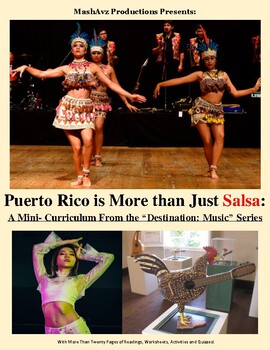Puerto Rico is More than just Salsa – A Mini Curriculum
- PDF
Description
In cultural terms, Puerto Rico is unique among Caribbean islands for two reasons: first, it contains a post-colonial music form (Jibaro) that is completely free of African influences. Second, its most famous music form - Salsa - was not actually invented on the island itself.
How did Brooklyn's Nuyorican community create a traditional music form while living so far away from the rhythms and melodies of home? Where can these influences be found among the throbbing beats of San Juan's current nightclub scene? 'Puerto Rico is More than just Salsa' is an 800-word survey of the island's musical history, from colonial days to the present. Produced with the assistance of the Museum of Puerto Rican Music (Poncé), each packet contains rare photos of traditional instruments, along with the following materials:
---'Puerto Rico is More than just Salsa' Vocabulary List
---'Puerto Rico is More than just Salsa' Reading Comprehension Quiz
---'Puerto Rico is More than just Salsa' Match-Em and 'Which One Doesn’t Belong?' Worksheet
'Destination: Caribbean' is a documentary and seven-part essay series that follow one Musicologist's journey into Caribbean History. All academic materials are in English. Appropriate for all ages, though subject matter is best suited for Grades 6 and up***
*****Cover photos courtesy of Joost Crop (@smallcamerabigpictures), Chris Yang (@chrisyangchrisfilm) and Colin Mulligan (@colinmulligan)





